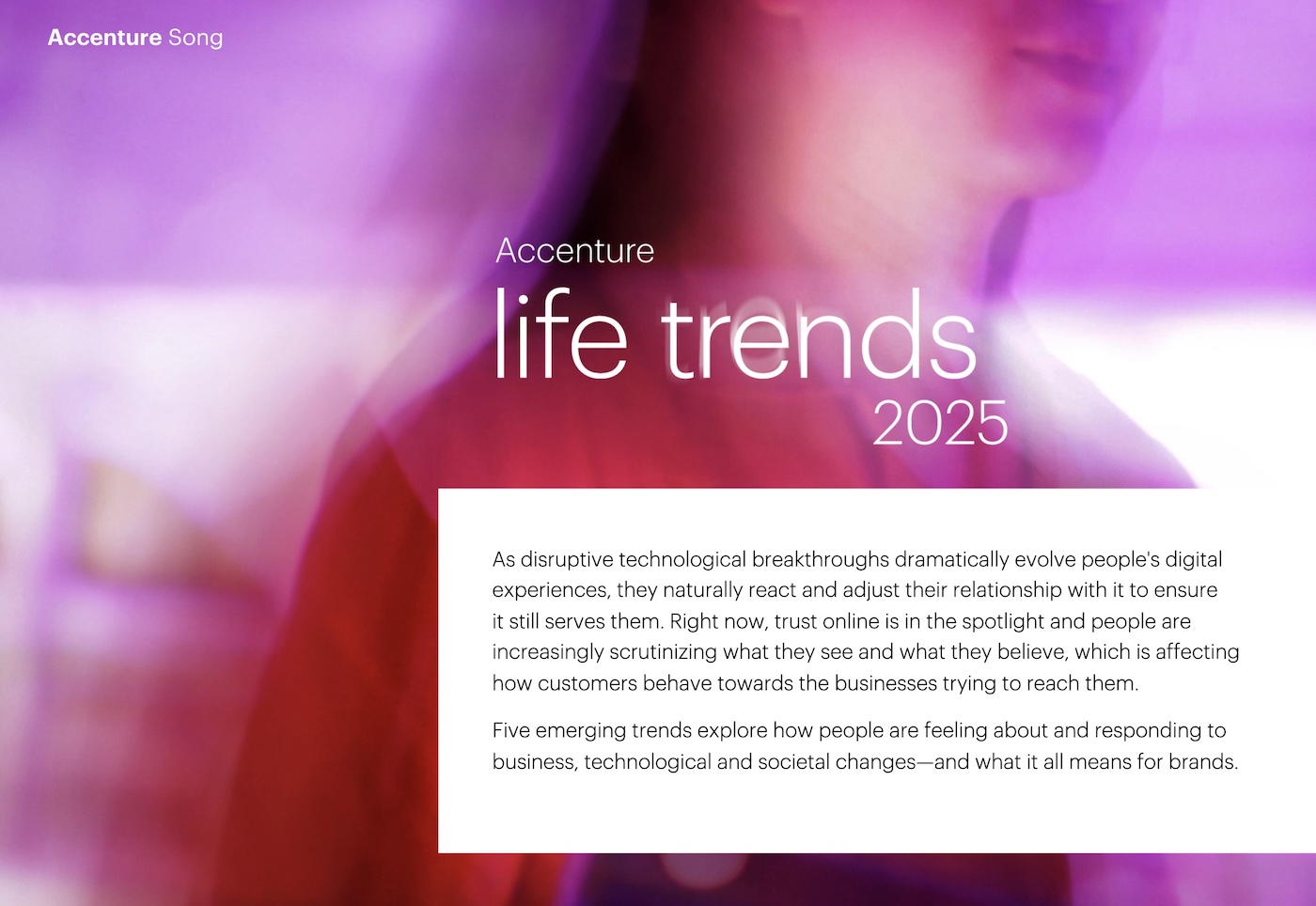Accenture’s Life Trends Report reveals insights on navigating consumer trust and digital shifts

Today, Accenture releases its highly anticipated Life Trends 2025 report, providing marketers with critical insights into building trust and transparency with consumers in an increasingly complex digital landscape.
With consumer trust wavering amidst rising online scams and an influx of generative AI content, the report offers actionable strategies to foster brand authenticity and stronger consumer relationships.
Accenture – Life Trends 2025
1. Social Rewilding
Australians are seeking deeper, more authentic experiences that reconnect them with nature and each other, a movement we’ve defined as social rewilding. This trend reflects a desire to balance technology with meaningful, sensory-rich interactions.
• Those looking for love are starting to step back from dating apps to explore ways to meet people in more traditional ways: Among Australian survey respondents dating in real life, 51% of those dating said they’re doing so more over the past 12 months,having switched from online equivalents.
• 59% of respondents said their most enjoyable experience in the previous week was a physical one, while only 15% said it was a digital one.
• 28% said they increasingly appreciate the“joy of missing out” on technology—or JOMO.
• Respondents also shared that they’re engaging in more in-person activities in the last 12 months: 33% of Australians said they’re spending more time with their friends in real life.
2. Era of mistrust
The trustworthiness of digital technology is under threat as a flood of scams blur the lines between real and deceptive content, disrupting online experiences: Australians lost over $7 millionto online shopping scams in 2023. The acceleration of generative AI content into all places where Australian people have traditionally discovered, socialised and shopped online is causing trust issues and fueling hesitation:
• 67% of Australians say that trust is an important factor to them when choosing to engage with a brand, while 59% said it was “convenience”
• 47% say they question the authenticity of product reviews, while 63% are questioning the authenticity of online content more than before.
• 27% have experienced deepfake attacks or scams for personal information and/or money.
3. Impatience economy
The immediacy of modern life is fostering impatience—and new behaviours to match. Technology makes it easier to find new routes to pursue a goal, with people seeking relatable advice on life’s complexities through social channels. Australians are using opportunities such as social media and other digital platforms to get to a desired result faster/easier.
• 32% said they get inspiration from social media on how to do things smarter. For those aged 18-34, it’s closer to half (47%)
• Technology is empowering people to find new ways to earn, spend and invest than ever before – a new era of side hustle. In the past year, 9% of respondents said they have started a new side hustle to make extra money.
4. The Parent Trap
Social media is increasingly becoming a concern for Australian parents, with some even pushing for a total ban on child social media use. Accenture’s research shows that the heavy impact of social media in daily life is piling up – yet people struggle to break behaviour patterns and habits:
• Identity: Australians aged 18-24 are more than five times as likely than those over 55 to agree that social media significantly impacts how they think about their own identity (40% vs. 8%).
• Time drain: About two-thirds of Gen Z and Millennials surveyed globally strongly agree that they’re spending more time online than they would like to (67% and 64% respectively).
5. Dignity of Work
Workplace relations are coming under strain in Australia, with changing industrial relations, fears about AI job replacement, and a crackdown on workplace flexibility such as return to office mandates.
• Emotional distancing between workers and work is clearer – workers want more flexibility, better balance, and higher salaries.
– Australians value work/life balance most highly (64%). A high salary (50%), job security (50%), flexibility in working time and arrangements (44%) and personal growth (15%) were also considered valuable to workers.
• Leadership must be transparent in the way that they are using and implementing technology within their organisations.
– According to Accenture research, 60% of employees globally are concerned about generative AI increasing their stress and burnout, but only 37% of leaders see this as a problem.
“Improving productivity and efficiency” is the message most frequently heard (36%) by Australian employees from their employers on Gen AI— more often than any other message. 61% find the use of generative AI tools in daily tasks helpful.
